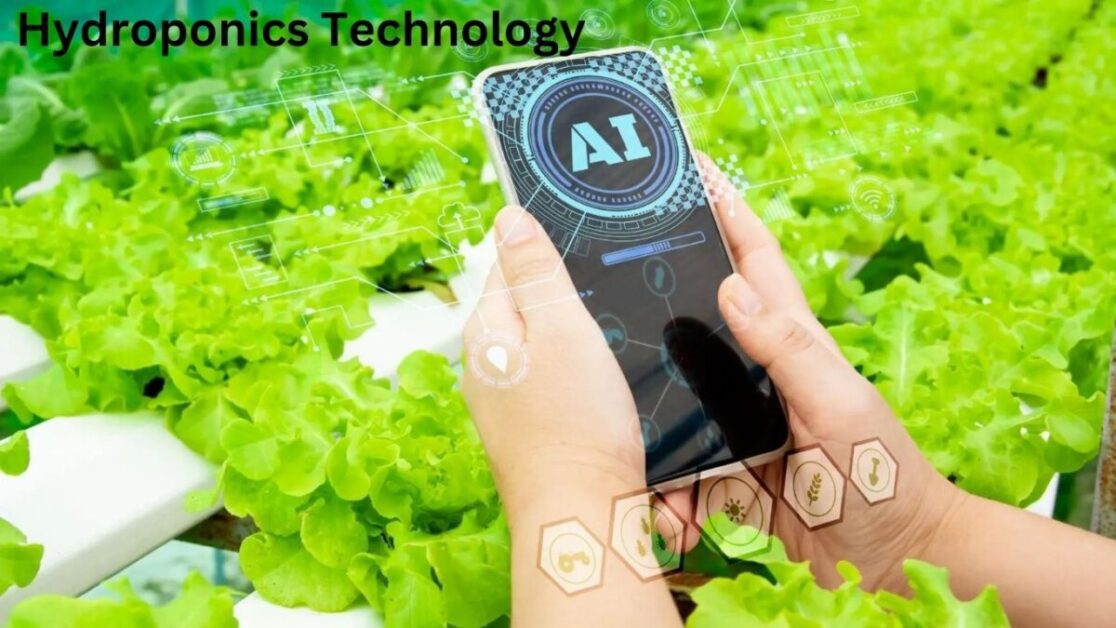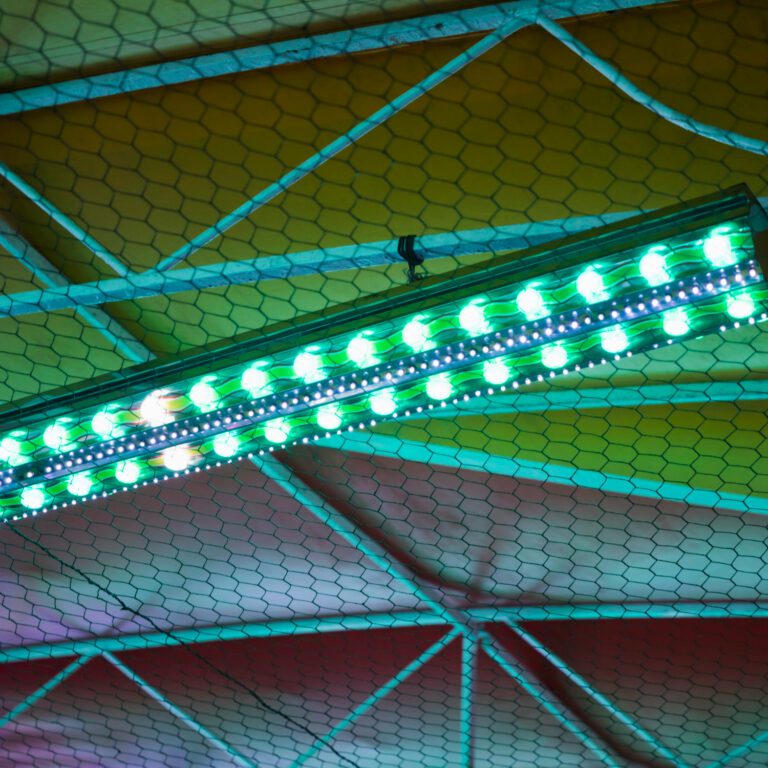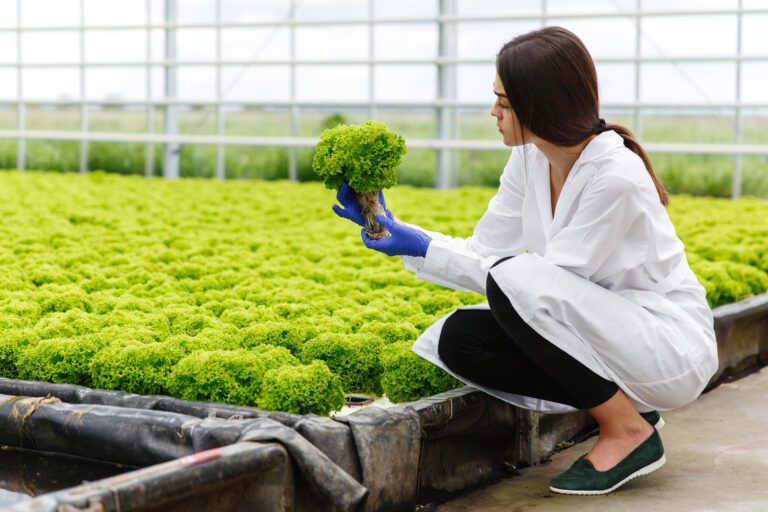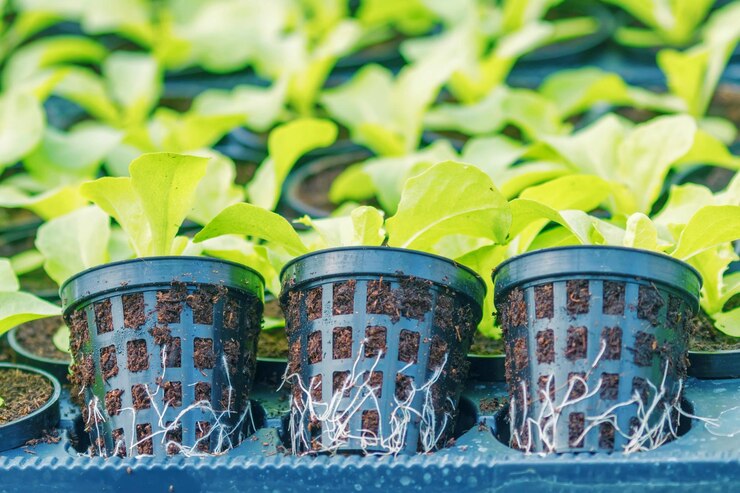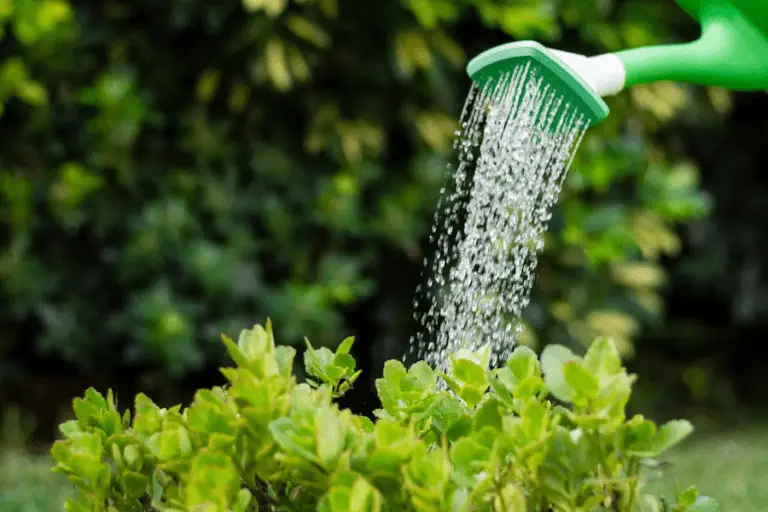The Best How AI is Revolutionizing Hydroponics Technology
Table of Contents: Hydroponics Technology
The Role of AI in Automating Hydroponic Systems
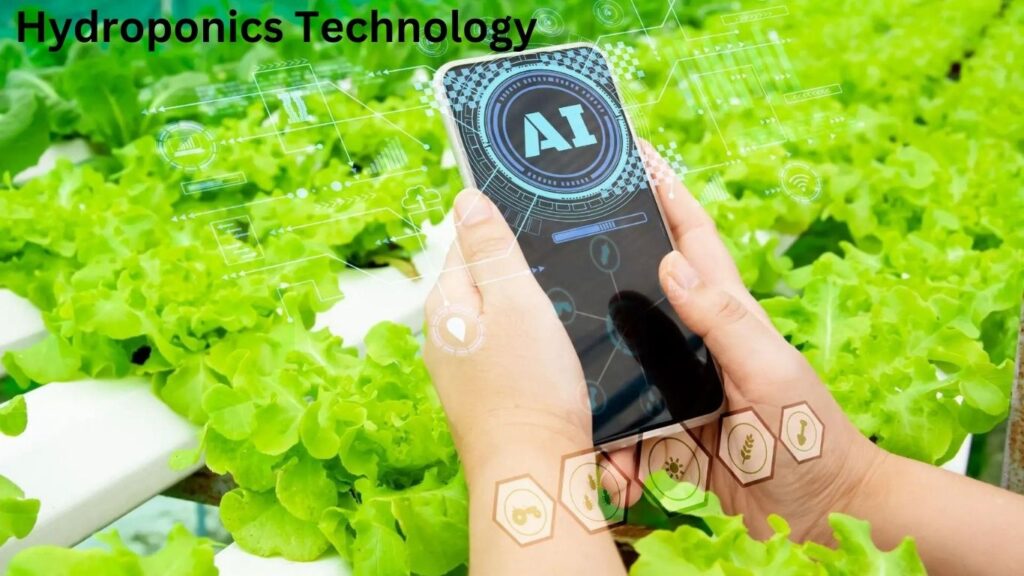
Hydroponic systems have revolutionized the way we cultivate crops, offering an efficient and sustainable solution for food production. With the advancement of Artificial Intelligence (AI), these systems are now becoming even more streamlined and automated, greatly enhancing their productivity and effectiveness.
AI plays a pivotal role in automating hydroponic systems by optimizing various aspects of plant growth. One key application is in the regulation of nutrient dosing. AI algorithms, coupled with sensors and monitoring devices, can analyze real-time data on nutrient levels, pH balance, and plant health, allowing for precise and customized nutrient delivery. This automation ensures that plants receive the optimal amount of nutrients at the right time, promoting healthy and robust growth. Moreover, AI can continuously adjust these parameters based on plant requirements, significantly reducing human intervention and optimizing resource utilization.
Another area where AI excels in automating hydroponic systems is in climate control. By integrating AI-powered sensors and actuators, growers can monitor and regulate environmental factors such as temperature, humidity, and ventilation. AI algorithms analyze data from these sensors, making real-time adjustments to create the ideal growing conditions for plants. This automation not only saves time and effort for growers but also ensures that plants thrive in an optimized environment. Additionally, AI can predict and prevent potential issues, such as excessive heat or humidity, by alerting growers and triggering appropriate actions.
In summary, AI is a game-changer in automating hydroponic systems, providing growers with an efficient and precise means of managing crop cultivation. By automating nutrient delivery and climate control, AI optimizes resource utilization, reduces human intervention, and ensures optimal plant growth. As technology continues to advance, we can expect even greater integration of AI in hydroponics, further enhancing its potential for sustainable and high-yielding crop production.
– AI algorithms, sensors, and monitoring devices optimize nutrient dosing in hydroponic systems
– Real-time data analysis ensures precise and customized nutrient delivery
– Continuous adjustment of parameters based on plant requirements reduces human intervention
– AI-powered sensors and actuators monitor and regulate climate factors like temperature and humidity
– Real-time adjustments create ideal growing conditions for plants
– AI predicts and prevents potential issues by alerting growers and triggering appropriate actions
– AI automation saves time, effort, and resources for growers
Improving Crop Management with AI in Hydroponics Technology
In today’s fast-paced world, the farming industry is constantly seeking innovative solutions to improve crop management and maximize yields. One promising technology that has gained significant attention in recent years is the integration of Artificial Intelligence (AI) in hydroponics. With its ability to analyze vast amounts of data and make intelligent decisions in real time, AI is revolutionizing the way hydroponic systems are managed.
AI-powered systems leverage sensors and machine learning algorithms to monitor and adjust various parameters crucial for plant growth, such as temperature, humidity, nutrient levels, and pH balance. By continuously analyzing this data, AI algorithms can detect patterns and make precise adjustments to create optimal growing conditions for plants. This results in improved crop quality, consistency, and overall yields.
Moreover, AI in hydroponics enables farmers to detect and address potential issues early on. For example, AI algorithms can analyze plant health data, such as leaf color, size, and shape, to identify signs of nutrient deficiencies or pests. By alerting farmers to these issues proactively, AI helps in preventing crop losses and minimizing the need for chemical interventions.
By equipping hydroponic systems with AI-driven decision support systems, farmers can access real-time insights and recommendations. These systems take into account various factors, such as weather forecasts, historical data, and specific crop requirements. With this information at their fingertips, farmers can make well-informed decisions on irrigation schedules, nutrient dosing, and pest control measures, optimizing the use of resources and ensuring sustainable practices.
In conclusion, the integration of AI in hydroponics opens up new possibilities for improving crop management and increasing yields. With its ability to analyze data, detect patterns, and make informed decisions, AI optimizes growing conditions, detects and addresses issues in a timely manner, and provides valuable insights for decision-making. As the farming industry continues to embrace technology, AI is proving to be an indispensable tool for hydroponic farmers, enhancing their ability to produce high-quality, consistent crops in a sustainable and efficient manner.
• AI-powered systems in hydroponics can monitor and adjust parameters crucial for plant growth, such as temperature, humidity, nutrient levels, and pH balance.
• Continuous analysis of data by AI algorithms helps create optimal growing conditions for plants, resulting in improved crop quality and overall yields.
• AI algorithms can analyze plant health data to detect signs of nutrient deficiencies or pests early on, preventing crop losses and minimizing the need for chemical interventions.
• Hydroponic systems equipped with AI-driven decision support systems provide real-time insights and recommendations based on weather forecasts, historical data, and specific crop requirements.
• Farmers can make well-informed decisions on irrigation schedules, nutrient dosing, and pest control measures with the information provided by AI systems.
• The integration of AI in hydroponics offers new possibilities for improving crop management practices while ensuring sustainable use of resources.
AI-assisted Nutrient Delivery in Hydroponics Technology
Nutrient delivery is a critical aspect of hydroponics, as it directly influences the growth and development of plants. With the integration of artificial intelligence (AI), nutrient delivery systems in hydroponics have advanced significantly. By leveraging AI technology, hydroponic farmers can now precisely monitor and regulate nutrient levels in their crops, leading to improved yields and higher crop quality.
AI-assisted nutrient delivery systems use real-time data collection and analysis to determine the precise nutrient requirements of plants at any given time. This data is collected through various sensors placed within the hydroponic system, such as pH and conductivity sensors. The AI algorithms then process this information and make accurate adjustments to the nutrient solution, ensuring optimal nutrient levels for the plants. This automated process eliminates the guesswork and human error associated with traditional nutrient delivery methods, allowing for more efficient and precise crop management.
Moreover, AI-assisted nutrient delivery systems offer farmers the ability to customize nutrient solutions for different stages of plant growth. By considering factors such as plant species, growth stage, and environmental conditions, AI algorithms can adjust the nutrient composition to meet the specific requirements of each crop. This level of customization not only maximizes plant growth but also minimizes wastage of nutrients, reducing costs and environmental impact.
In conclusion, AI-assisted nutrient delivery systems have revolutionized hydroponic farming by optimizing nutrient management and enhancing crop production. With their ability to collect and analyze real-time data, these systems provide farmers with accurate insights into nutrient requirements, leading to improved crop health and yield. As technology continues to evolve, we can expect further advancements in AI-driven nutrient delivery systems, providing even greater precision and efficiency in hydroponic farming.
• AI-assisted nutrient delivery systems use real-time data collection and analysis to determine precise nutrient requirements
• Sensors such as pH and conductivity sensors collect data within the hydroponic system
• AI algorithms process the information and make accurate adjustments to the nutrient solution
• Eliminates guesswork and human error associated with traditional methods
• Allows for more efficient and precise crop management
• Customization of nutrient solutions for different stages of plant growth is possible with AI algorithms
• Factors such as plant species, growth stage, and environmental conditions are considered in adjusting nutrient composition
• Maximizes plant growth while minimizing wastage of nutrients
• Reduces costs and environmental impact
In conclusion, AI-assisted nutrient delivery systems have revolutionized hydroponic farming:
• Optimizes nutrient management
• Enhances crop production
• Provides accurate insights into nutrient requirements
As technology continues to evolve, we can expect further advancements in AI-driven nutrient delivery systems.
Enhancing Plant Health Monitoring with AI in Hydroponics Technology
Hydroponics, the practice of growing plants without soil, offers numerous advantages such as efficient use of resources, controlled environment, and optimal nutrient delivery. However, one of the key challenges faced by hydroponic farmers is maintaining the health and vitality of their plants. This is where AI, or Artificial Intelligence, comes into play, revolutionizing plant health monitoring in hydroponics.
By leveraging AI-powered technologies, hydroponic systems can constantly assess the health of plants, providing real-time feedback and alerts to farmers. Through the analysis of various factors such as temperature, humidity, nutrient levels, and even leaf coloration, AI algorithms can accurately detect signs of stress, nutrient deficiencies, or diseases. This enables growers to quickly address any issues before they can negatively impact plant growth and overall crop yield.
Moreover, AI-assisted plant health monitoring goes beyond just identifying problems. This technology can also offer tailored solutions and recommendations, helping farmers optimize their cultivation practices. By analyzing large amounts of data from previous crops, weather patterns, and yield records, AI algorithms can provide valuable insights into optimal nutrient dosages, temperature ranges, and watering schedules. This not only enhances the health and vigor of plants but also helps maximize resource efficiency and minimize waste.
With the advancements in AI technology, hydroponic farmers can now have a vigilant virtual assistant monitoring their crops, detecting potential issues, and providing data-driven recommendations to ensure plant health. The integration of AI in plant health monitoring in hydroponics opens up new possibilities for increased productivity, improved crop quality, and sustainable farming practices. As we dive deeper into this exciting realm of AI-driven solutions, the future of hydroponics looks promising, with endless opportunities for continuous innovation and growth.
• AI-powered technologies in hydroponics constantly assess plant health, providing real-time feedback and alerts to farmers.
• AI algorithms analyze factors such as temperature, humidity, nutrient levels, and leaf coloration to detect signs of stress or diseases.
• Quick detection allows growers to address issues before they negatively impact plant growth and crop yield.
• AI-assisted monitoring offers tailored solutions and recommendations for optimizing cultivation practices.
• By analyzing data from previous crops, weather patterns, and yield records, AI algorithms provide insights into optimal nutrient dosages, temperature ranges, and watering schedules.
• Enhancing plant health not only improves crop quality but also maximizes resource efficiency and minimizes waste in hydroponics farming.
• The integration of AI in plant health monitoring opens up new possibilities for increased productivity and sustainable farming practices.
AI-powered Data Analysis for Optimal Hydroponic Technology Crop Growth
To achieve the optimal growth of crops in hydroponic systems, AI-powered data analysis plays a crucial role. By utilizing advanced algorithms and machine learning techniques, AI can analyze vast amounts of data collected from sensors, monitors, and other IoT devices within the hydroponic setup. This data includes information about temperature, humidity, nutrient levels, pH balance, and other environmental factors that impact plant growth.
With AI-powered data analysis, hydroponic farmers can gain valuable insights into their crop’s specific needs and make data-driven decisions to optimize growth conditions. For instance, AI can identify patterns and correlations between environmental factors and crop performance, allowing farmers to adjust variables such as lighting intensity, nutrient concentrations, or even air circulation. This level of precision ensures that plants receive the ideal conditions for their growth and development, resulting in better yields and higher-quality produce.
Moreover, AI-powered data analysis enables real-time monitoring and feedback mechanisms, alerting farmers of any anomalies or deviations from the optimal parameters. By promptly identifying potential issues, such as nutrient imbalances, temperature fluctuations, or disease outbreaks, farmers can take immediate corrective actions, saving valuable time and resources. Additionally, AI can provide recommendations on how to resolve these issues based on historical data and best practices, further assisting farmers in ensuring optimal crop health and productivity.
In conclusion, AI-powered data analysis revolutionizes hydroponic crop growth by providing farmers with accurate and timely information about their plants’ needs. With its ability to process vast amounts of data and identify patterns, AI empowers farmers to make informed decisions and optimize crop conditions for maximum yields. By harnessing the potential of AI in hydroponic systems, farmers can achieve consistent and superior-quality produce, contributing to the advancement of sustainable and efficient agriculture.
• AI-powered data analysis utilizes advanced algorithms and machine learning techniques to analyze data collected from sensors, monitors, and IoT devices in hydroponic systems.
• This data includes information about temperature, humidity, nutrient levels, pH balance, and other environmental factors that affect plant growth.
• AI can identify patterns and correlations between environmental factors and crop performance to optimize growth conditions.
• Farmers can adjust variables such as lighting intensity or nutrient concentrations based on insights provided by AI analysis.
• Real-time monitoring and feedback mechanisms alert farmers of any anomalies or deviations from optimal parameters.
• Prompt identification of potential issues allows farmers to take immediate corrective actions, saving time and resources.
• AI provides recommendations on resolving issues based on historical data and best practices for optimal crop health.
• AI-powered data analysis revolutionizes hydroponic crop growth by providing accurate information about plants’ needs.
• By harnessing the potential of AI in hydroponic systems, farmers can achieve consistent yields of superior-quality produce.
The Role of AI in Predictive Analytics for Hydroponic Farming
Hydroponic farming has revolutionized agriculture by providing an efficient and sustainable method of crop production. However, the success of hydroponics relies heavily on the accurate prediction of crop growth and development. This is where the integration of Artificial Intelligence (AI) and predictive analytics becomes invaluable.
AI-powered predictive analytics in hydroponic farming involves the use of advanced algorithms and machine learning techniques to analyze vast amounts of data collected from various sources such as sensors, weather forecasts, and historical crop performance. By analyzing this data, AI can accurately identify patterns, trends, and potential risks, enabling farmers to make informed decisions and adjust their cultivation practices accordingly.
With the help of AI, hydroponic farmers can predict the optimal growing conditions for their crops, such as temperature, humidity, and nutrient levels. By analyzing historical data and real-time inputs, AI algorithms can forecast the growth rate, yield, and quality of crops with remarkable accuracy. This allows farmers to proactively address any potential issues before they impact crop health and overall productivity.
Moreover, AI-powered predictive analytics can assist farmers in optimizing resource allocation. By analyzing data on water and nutrient usage, AI algorithms can suggest the most efficient and sustainable distribution, reducing waste and ensuring maximum crop benefit.
In conclusion, AI in predictive analytics is revolutionizing hydroponic farming by providing farmers with invaluable insights into crop growth, yield prediction, and resource allocation. By harnessing the power of AI, hydroponic farmers can make data-driven decisions, optimize cultivation practices, and achieve higher crop yields while reducing environmental impact. The future of hydroponics Technology is undoubtedly intertwined with the potential of AI, driving continuous innovation in the field.
• AI-powered predictive analytics in hydroponic farming involves the use of advanced algorithms and machine learning techniques.
• The data analyzed by AI includes information from sensors, weather forecasts, and historical crop performance.
• AI can accurately identify patterns, trends, and potential risks to help farmers make informed decisions.
• Predictive analytics helps farmers determine optimal growing conditions such as temperature, humidity, and nutrient levels.
• By analyzing historical data and real-time inputs, AI algorithms can forecast crop growth rate, yield, and quality with remarkable accuracy.
• This allows farmers to proactively address potential issues before they impact crop health and productivity.
• AI-powered predictive analytics also assists in optimizing resource allocation for water and nutrients usage.
• It suggests the most efficient distribution to reduce waste while maximizing crop benefit.
• In conclusion, AI revolutionizes hydroponic farming by providing insights into growth prediction and resource allocation.
• Farmers can make data-driven decisions for higher yields while reducing environmental impact.
AI-driven Climate Control for Hydroponics Technology
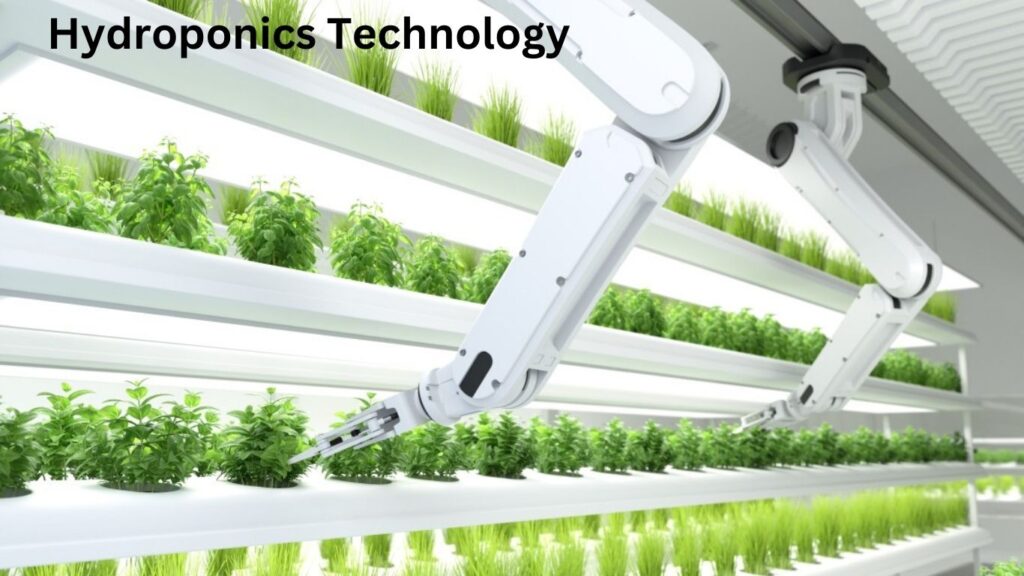
AI-driven climate control systems have emerged as a game-changer in the field of hydroponics, offering unprecedented control and precision in maintaining optimal growing conditions for crops. By integrating artificial intelligence into climate control systems, hydroponic farmers can achieve greater consistency and productivity in their operations.
One of the key advantages of AI-driven climate control systems is their ability to adapt and respond to the specific needs of different plant species. The technology can analyze real-time data on temperature, humidity, CO2 levels, and other environmental factors, and make accurate adjustments to provide the ideal growing conditions for each crop. This ensures that plants receive the precise combination of temperature, humidity, and light required for optimal growth and development, leading to higher yields and better crop quality.
Furthermore, AI-driven climate control systems can anticipate and mitigate potential issues before they become detrimental to the crops. By continuously monitoring and analyzing data, these systems can detect deviations from the optimal conditions and alert farmers to take corrective actions. This proactive approach enables farmers to prevent problems such as plant stress, nutrient deficiencies, or disease outbreaks, thereby minimizing crop losses and maintaining a healthier growing environment.
In conclusion, AI-driven climate control systems are revolutionizing hydroponics by providing farmers with the tools to create precisely controlled environments for their crops. These systems optimize growing conditions, ensure consistent crop quality, and enhance productivity by leveraging real-time data analysis and predictive capabilities. With the integration of AI, hydroponic farmers can achieve higher yields, minimize risks, and pave the way for a more efficient and sustainable future of hydroponic farming.
• AI-driven climate control systems offer unprecedented control and precision in maintaining optimal growing conditions for hydroponic crops.
• These systems analyze real-time data on temperature, humidity, CO2 levels, and other environmental factors to provide the ideal growing conditions for each crop.
• The precise combination of temperature, humidity, and light provided by AI-driven systems leads to higher yields and better crop quality.
• AI-driven climate control systems can anticipate and mitigate potential issues before they become detrimental to the crops by continuously monitoring and analyzing data.
• This proactive approach helps prevent problems such as plant stress, nutrient deficiencies, or disease outbreaks, minimizing crop losses.
• By integrating AI into hydroponics, farmers can create precisely controlled environments for their crops that optimize growing conditions consistently.
• Real-time data analysis and predictive capabilities enhance productivity in hydroponic farming with higher yields and minimized risks.
Leveraging AI for Pest and Disease Detection in Hydroponics Technology
Pest and disease management is a critical aspect of hydroponic farming, as the closed environment of these systems can create favorable conditions for the proliferation of harmful organisms. Traditionally, hydroponic growers have relied on manual scouting and visual inspection to detect pests and diseases. However, this approach can be time-consuming, labor-intensive, and prone to human error.
This is where the integration of artificial intelligence (AI) technology can revolutionize pest and disease detection in hydroponics Technology. By leveraging AI algorithms and machine learning techniques, hydroponic farmers can now deploy advanced sensors and imaging systems to monitor their crops in real-time. These systems collect vast amounts of data on plant health, growth patterns, and environmental conditions. AI algorithms then analyze this data, detecting subtle changes in plant physiology, leaf color, or growth rates that may indicate the presence of pests or diseases. The ability of AI to process large datasets and identify patterns that may go unnoticed by the human eye is a game-changer for hydroponic farmers, as it allows for early detection and timely intervention, minimizing crop losses and reducing the reliance on chemical pesticides.
• AI technology can revolutionize pest and disease detection in hydroponics Technology
• Integration of AI algorithms and machine learning techniques allows for real-time monitoring of crops
• Advanced sensors and imaging systems collect data on plant health, growth patterns, and environmental conditions
• AI algorithms analyze this data to detect subtle changes that may indicate the presence of pests or diseases
• Early detection through AI enables timely intervention, minimizing crop losses
• Reduced reliance on chemical pesticides due to early intervention
AI-enabled Decision Support for Hydroponic Technology Farmers
With the ever-increasing complexity of hydroponic farming, the need for efficient decision-making tools has become paramount. AI-enabled decision support systems offer a promising solution for hydroponic farmers, providing them with actionable insights and recommendations to optimize their operations.
These systems leverage the power of artificial intelligence to analyze vast amounts of data collected from various sources within the hydroponic system. By integrating data from sensors, weather forecasts, crop health monitoring devices, and historical records, AI algorithms can identify patterns, correlations, and trends that may not be readily apparent to human farmers. This enables them to make more informed decisions regarding nutrient management, pest control, lighting schedules, and other crucial factors that impact crop health and yields. Moreover, the real-time nature of these systems allows for rapid adjustments and interventions when needed, minimizing the risk of crop failure and maximizing productivity.
• AI-enabled decision support systems analyze vast amounts of data collected from various sources within the hydroponic system.
• These systems integrate data from sensors, weather forecasts, crop health monitoring devices, and historical records.
• AI algorithms can identify patterns, correlations, and trends that may not be readily apparent to human farmers.
• This enables farmers to make more informed decisions regarding nutrient management, pest control, lighting schedules, and other crucial factors.
• The real-time nature of these systems allows for rapid adjustments and interventions when needed.
• This minimizes the risk of crop failure and maximizes productivity.
The Integration of AI and Machine Learning in Hydroponic Technology
Artificial Intelligence (AI) and Machine Learning (ML) have emerged as promising technologies in the field of hydroponic technology, revolutionizing the way we manage and optimize crop production. By integrating AI and ML into hydroponic systems, we can achieve higher levels of efficiency, productivity, and sustainability.
One of the key advantages of AI and ML in hydroponics Technology is their ability to gather and analyze vast amounts of data. By collecting data from sensors, weather forecasts, and historical patterns, AI algorithms can make accurate predictions and recommendations for optimal crop growth. These technologies can also learn and adapt from previous experiences, continuously improving their performance and fine-tuning crop management strategies.
Furthermore, AI and ML can automate various aspects of hydroponic systems, reducing the need for manual intervention and allowing for more precise and timely actions. From nutrient delivery to climate control and pest detection, AI-powered systems streamline operations and ensure the ideal growing conditions for plants. This level of automation not only saves time and effort for hydroponic farmers but also minimizes the risk of human error and enhances overall crop health.
In conclusion, the integration of AI and ML in hydroponic technology has the potential to revolutionize the way we grow crops. With their ability to analyze data, automate processes, and optimize decision-making, these technologies can significantly improve efficiency, productivity, and sustainability in hydroponics. As we continue to advance in this field, it is important to explore and harness the full potential of AI and ML to further enhance our hydroponic systems and ensure a brighter and more sustainable future for agriculture.
• AI and ML can gather and analyze vast amounts of data from sensors, weather forecasts, and historical patterns.
• AI algorithms can make accurate predictions and recommendations for optimal crop growth.
• These technologies continuously learn and adapt from previous experiences to fine-tune crop management strategies.
• Automation through AI and ML reduces the need for manual intervention in hydroponic systems.
• AI-powered systems streamline operations such as nutrient delivery, climate control, and pest detection.
• Automation saves time, minimizes human error, and enhances overall crop health in hydroponics Technology.
• The integration of AI and ML has the potential to revolutionize crop production in hydroponics Technology.
• Efficiency, productivity, and sustainability are significantly improved with these technologies.
• It is crucial to explore the full potential of AI and ML to enhance hydroponic systems further.
AI’s Contribution to Water and Energy Optimization in Hydroponics Technology
Water and energy optimization are critical factors in hydroponics Technology, and artificial intelligence (AI) has emerged as a valuable tool in achieving efficiency in these areas. With the ability to collect and analyze vast amounts of data, AI systems can provide real-time insights and recommendations to help hydroponic farmers make informed decisions regarding water and energy usage.
One way AI contributes to water optimization in hydroponics Technology is through precise irrigation management. By monitoring factors such as humidity, temperature, plant moisture levels, and weather forecasts, AI algorithms can determine the exact amount of water needed for each crop. This eliminates the risk of over or under watering, reducing water waste and improving plant health. Additionally, AI can detect and respond to changes in plant water requirements, adapting the irrigation schedule accordingly to ensure optimal growth and minimize water usage.
In terms of energy optimization, AI plays a crucial role in controlling climate conditions within hydroponic systems. AI-powered climate control systems can analyze environmental data, including temperature, humidity, and CO2 levels, and adjust heating, cooling, and ventilation accordingly. This intelligent automation helps maintain optimal growing conditions while minimizing unnecessary energy consumption. By optimizing energy usage, hydroponic farmers can reduce their carbon footprint and save on energy costs, contributing to a more sustainable and economically viable farming practice.
Through its ability to analyze data, make predictions, and automate processes, AI significantly contributes to water and energy optimization in hydroponics Technology. As the technology continues to advance, the potential for even greater efficiency gains in the industry becomes increasingly promising. Harnessing the power of AI allows hydroponic farmers to enhance resource management, increase productivity, and contribute to a more sustainable future of agriculture.
• AI systems can collect and analyze data to provide real-time insights and recommendations for water and energy usage in hydroponics Technology.
• Precise irrigation management is facilitated by AI algorithms that monitor factors such as humidity, temperature, plant moisture levels, and weather forecasts to determine the exact amount of water needed for each crop.
• AI eliminates the risk of over or under watering, reducing water waste and improving plant health.
• AI can detect changes in plant water requirements and adapt the irrigation schedule accordingly to ensure optimal growth while minimizing water usage.
• AI-powered climate control systems analyze environmental data to adjust heating, cooling, and ventilation within hydroponic systems, maintaining optimal growing conditions while minimizing unnecessary energy consumption.
• By optimizing energy usage, hydroponic farmers can reduce their carbon footprint and save on energy costs.
• The advancement of AI technology holds even greater potential for efficiency gains in the industry.
• Harnessing the power of AI allows hydroponic farmers to enhance resource management, increase productivity, and contribute to a more sustainable future of agriculture.
Enhancing Resource Allocation with AI in Hydroponics Technology Farming
The efficient allocation of resources is crucial in hydroponic farming to ensure optimal crop growth and maximize yields. With the advancements in artificial intelligence (AI), hydroponic farmers now have access to intelligent systems that can enhance resource allocation in their operations.
AI technology can analyze various factors such as plant nutrient levels, environmental conditions, and water usage to determine the ideal resource allocation for each plant. By collecting real-time data from sensors and monitoring systems, AI algorithms can make accurate predictions and adjustments, ensuring that plants receive the right amount of nutrients, water, and light at the right time.
Furthermore, AI can also help farmers optimize their resource allocation by detecting any anomalies or deficiencies in the system. For example, AI-powered systems can analyze the nutrient solution’s composition and pH levels, flagging any imbalances or inconsistencies. This allows farmers to take proactive measures and adjust the nutrient delivery accordingly, preventing potential crop damage or yield loss.
By leveraging AI technology, hydroponic farmers can optimize their resource allocation, minimize waste, and improve overall efficiency in their operations. The ability to precisely monitor and adjust nutrient levels, water usage, and environmental conditions not only ensures healthier plant growth but also contributes to sustainable and eco-friendly farming practices. AI-driven resource allocation systems provide a valuable tool for hydroponic farmers, enabling them to make data-driven decisions and achieve the best possible crop yields.
• AI technology can analyze plant nutrient levels, environmental conditions, and water usage to determine ideal resource allocation
• Real-time data collection from sensors and monitoring systems allows for accurate predictions and adjustments
• AI-powered systems can detect anomalies or deficiencies in the system, allowing farmers to take proactive measures
• Optimization of resource allocation leads to minimized waste and improved efficiency in operations
• Precise monitoring and adjustment of nutrient levels, water usage, and environmental conditions contribute to sustainable farming practices
AI-powered Remote Monitoring and Control in Hydroponics Technology
One of the key advancements in hydroponics Technology is the integration of AI-powered remote monitoring and control systems. These innovative technologies have revolutionized the way growers manage their hydroponic setups, offering real-time insights and seamless control over various aspects of the growing environment.
By leveraging artificial intelligence, remote monitoring systems can constantly collect and analyze data from sensors placed throughout the hydroponic system. This includes parameters such as temperature, humidity, pH levels, nutrient concentrations, and light intensity. With this wealth of information, growers can make data-driven decisions, optimizing the conditions for plant growth and health.
Furthermore, AI-powered control systems allow growers to remotely adjust and fine-tune their hydroponic setups. Through a user-friendly interface, growers can regulate factors like temperature, nutrient delivery, and lighting schedules, ensuring that the plants receive the precise conditions they need at any given time. This level of control not only maximizes crop yields but also minimizes the risks associated with human error and variability.
The integration of AI-powered remote monitoring and control in hydroponic systems offers enormous benefits to growers. It empowers them to make informed decisions, optimize growth conditions, and ultimately achieve higher yields and improved crop quality. As this technology continues to advance, it holds immense potential for the future of hydroponics Technology, bringing us closer to a more sustainable and efficient approach to farming.
• Remote monitoring systems collect and analyze data from sensors throughout the hydroponic system
• Data includes temperature, humidity, pH levels, nutrient concentrations, and light intensity
• Growers can make data-driven decisions to optimize plant growth conditions
• AI-powered control systems allow remote adjustment of factors like temperature and lighting schedules
• Precise control minimizes risks associated with human error and variability
• Benefits of AI-powered remote monitoring and control include informed decision-making, optimized growth conditions, higher yields, and improved crop quality
• Advancements in this technology hold immense potential for the future of hydroponics
The Role of AI in Improving Crop Quality and Consistency in Hydroponics Technology
Hydroponics, a soilless method of growing plants, has gained popularity in recent years due to its ability to provide optimal conditions for crop growth. However, one of the challenges faced by hydroponic farmers is ensuring consistent crop quality. This is where artificial intelligence (AI) comes into play, revolutionizing the way crops are grown in hydroponics systems.
AI has the potential to improve crop quality and consistency in hydroponics Technology by providing precise and real-time monitoring of various environmental factors such as temperature, humidity, lighting, and nutrient levels. By continuously collecting data from sensors placed throughout the hydroponic system, AI algorithms can analyze this information and make informed decisions to optimize growing conditions for each plant.
Furthermore, AI can assist in crop quality control by monitoring parameters such as pH levels, electrical conductivity, and nutrient uptake. By accurately measuring and adjusting these variables, AI can ensure that plants receive the proper amount and balance of nutrients needed for healthy growth. This not only enhances crop quality but also reduces the risk of nutrient deficiencies or toxicities, resulting in more consistent and desirable produce.
In conclusion, AI plays a crucial role in improving crop quality and consistency in hydroponics Technology. By leveraging AI technology, hydroponic farmers can benefit from real-time monitoring, precise control of environmental factors, and optimized nutrient management. With AI as a powerful tool in their arsenal, hydroponic farmers can achieve higher crop yields, superior crop quality, and ultimately, increased profitability in this ever-growing industry.
• AI provides precise and real-time monitoring of environmental factors such as temperature, humidity, lighting, and nutrient levels.
• Continuous data collection from sensors allows AI algorithms to analyze information and optimize growing conditions for each plant.
• AI monitors parameters like pH levels, electrical conductivity, and nutrient uptake to ensure plants receive the proper amount and balance of nutrients.
• Accurate measurement and adjustment of variables by AI reduces the risk of nutrient deficiencies or toxicities.
• The use of AI in hydroponics Technology improves crop quality by enhancing consistency and reducing undesirable variations in produce.
• Real-time monitoring provided by AI technology helps farmers make informed decisions for optimal crop growth.
Overcoming Challenges in Hydroponics Technology with AI-driven Solutions
Hydroponics Technology, as a method of cultivating plants without soil, presents unique challenges that can hinder crop growth and overall productivity. However, with the advent of AI-driven solutions, these challenges can be overcome, leading to improved outcomes in hydroponic farming.
One major challenge in hydroponics is achieving the optimal balance of nutrients for plant growth. Maintaining precise nutrient levels in a hydroponic system is crucial, as incorrect ratios can result in stunted growth or nutrient deficiencies. AI-assisted nutrient delivery systems offer a solution by continuously monitoring plant health indicators, such as leaf color and growth rate, and adjusting nutrient levels accordingly. By analyzing vast amounts of data and making real-time adjustments, these AI systems can ensure that plants receive the nutrients they need for optimal growth.
Another challenge in hydroponics is the effective management of pests and diseases. In traditional farming, visual inspections and manual interventions are commonly used to identify and treat pests and diseases. However, in hydroponics Technology, where the lack of soil can limit natural pest control mechanisms, AI-powered pest and disease detection systems can play a vital role. These systems utilize computer vision algorithms to monitor plant health, identifying any signs of infestation or disease at an early stage. By providing early detection and targeted treatment options, AI can help hydroponic farmers maintain healthier crops and prevent severe losses.
In conclusion, AI-driven solutions offer promising ways to overcome the challenges faced in hydroponics Technology. With AI-assisted nutrient delivery systems and AI-powered pest and disease detection, hydroponic farmers can enhance crop management and ensure optimal plant health. By leveraging the capabilities of AI, hydroponic farming can become more efficient, productive, and sustainable.
– AI-assisted nutrient delivery systems continuously monitor plant health indicators and adjust nutrient levels accordingly
– These systems analyze vast amounts of data to ensure plants receive the nutrients they need for optimal growth
– AI-powered pest and disease detection systems utilize computer vision algorithms to monitor plant health and identify early signs of infestation or disease
– Early detection allows for targeted treatment options, preventing severe losses in hydroponic crops
– By leveraging AI capabilities, hydroponic farming can become more efficient, productive, and sustainable
The Future of Hydroponics Technology: AI’s Potential for Continuous Innovation
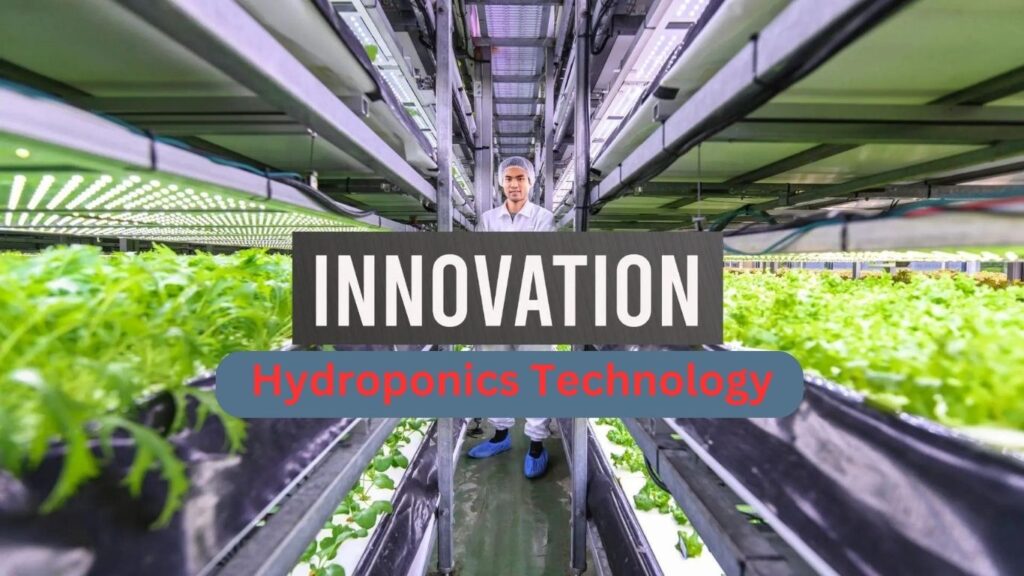
With the rapid advancement of technology, the future of hydroponics holds immense potential for continuous innovation, thanks to the integration of artificial intelligence (AI). AI has revolutionized various industries, and hydroponics is no exception. By leveraging AI technologies, hydroponic farmers can enhance crop management, optimize resource allocation, and overcome challenges in this modern farming method.
AI-powered systems can automate hydroponic processes, making them more efficient and less labor-intensive. With AI-assisted nutrient delivery systems, for example, hydroponic farmers can precisely monitor and regulate the distribution of nutrients to plants, ensuring optimal growth and development. AI also plays a vital role in plant health monitoring, utilizing advanced algorithms to detect signs of diseases or nutritional deficiencies early on. This enables farmers to take proactive measures and prevent potential crop losses. Additionally, AI-driven data analysis provides valuable insights for crop growth optimization, taking into account factors such as climate, light intensity, and nutrient levels. By analyzing vast amounts of data in real-time, AI algorithms can suggest adjustments to environmental conditions, maximizing yields and minimizing waste.
The potential of AI in hydroponics expands beyond crop management. With AI-enabled decision support systems, hydroponic farmers can make informed choices based on data-driven recommendations. Whether it’s selecting the right crop varieties or determining the ideal time for harvesting, AI provides valuable insights to maximize profitability and efficiency. Furthermore, AI’s contribution to water and energy optimization in hydroponics is significant. By constantly monitoring and adjusting factors such as water flow rates and light intensity, AI-driven systems can reduce water and energy consumption, making hydroponics Technology more sustainable and eco-friendly.
In conclusion, the integration of AI in hydroponics Technology offers exciting possibilities for continuous innovation. By harnessing AI technologies, hydroponic farmers can improve crop quality, enhance resource management, and overcome challenges in this modern farming practice. As the future unfolds, AI’s potential in hydroponics will likely lead to further advancements and efficiencies, fueling the growth and success of this sustainable farming method.
• AI-powered systems automate hydroponic processes, making them more efficient and less labor-intensive.
• AI-assisted nutrient delivery systems enable precise monitoring and regulation of nutrient distribution to plants.
• AI plays a vital role in plant health monitoring, detecting signs of diseases or nutritional deficiencies early on.
• AI-driven data analysis provides valuable insights for crop growth optimization, considering factors such as climate and light intensity.
• AI-enabled decision support systems help make informed choices based on data-driven recommendations.
• AI contributes to water and energy optimization in hydroponics Technology, reducing consumption and promoting sustainability.
Here’s a table highlighting how AI is revolutionizing hydroponics technology:
| Aspect | AI Contribution to Hydroponics Technology |
|---|---|
| Automated Monitoring | AI-powered sensors continuously monitor plant health, nutrient levels, and environmental conditions in real-time. |
| Data Analysis | AI algorithms analyze vast datasets, providing insights into optimal nutrient formulations, growth patterns, and disease detection. |
| Precision Nutrient Delivery | AI systems precisely control nutrient dosages based on plant needs, optimizing resource utilization and minimizing waste. |
| Climate Control | AI-driven climate control systems adjust temperature, humidity, and light cycles to create ideal growing conditions for specific crops. |
| Predictive Analytics | AI predicts plant growth rates, harvest times, and potential issues, allowing growers to plan and optimize production schedules. |
| Crop Optimization | AI recommends crop varieties, growing techniques, and nutrient profiles for maximum yield, quality, and resource efficiency. |
| Energy Efficiency | AI optimizes energy usage by regulating lighting, ventilation, and other systems, reducing overall operational costs. |
| Remote Monitoring | AI enables remote monitoring and control of hydroponic systems through mobile apps, providing flexibility and convenience to growers. |
| Disease Detection | AI algorithms analyze plant images to identify early signs of diseases or pests, allowing for proactive intervention and prevention. |
| Machine Learning in Farm Management | AI learns from historical data, adapting and improving system performance over time, leading to more efficient and effective hydroponic operations. |
| Customized Growing Protocols | AI tailors growing protocols based on individual plant needs, ensuring optimized conditions for different crops within the same system. |
| Resource Optimization | AI assists in optimizing the use of water, nutrients, and space, promoting sustainable and resource-efficient hydroponic farming. |
The integration of AI into hydroponics technology offers numerous advantages, including increased efficiency, higher yields, and more sustainable farming practices. Growers benefit from advanced analytics and automation, allowing for better decision-making and improved overall crop management.
Note: The headings provided above are only suggestions and can be modified to fit the desired structure and content Hydroponics Technology
The headings provided above offer a range of possibilities for exploring the exciting role of AI in hydroponic systems. These headings can be tailored to match the specific needs and interests of readers, providing valuable insights into how AI technology can enhance various aspects of hydroponics Technology. By delving into these topics, gardening enthusiasts can gain a deeper understanding of the potential benefits that AI offers in automating hydroponic systems, improving crop management, and optimizing resource allocation. Furthermore, they can explore how AI can assist in monitoring plant health, analyzing data for optimal crop growth, and implementing climate control systems. The integration of AI and machine learning in hydroponic technology opens up a world of possibilities for enhanced productivity, quality control, and innovation in this sustainable method of farming.
As hydroponics continue to evolve and shape the future of agriculture, AI-driven solutions have the potential to overcome various challenges faced by hydroponic farmers. These advanced technologies can facilitate pest and disease detection, offer decision support systems, and optimize water and energy usage. With AI-powered remote monitoring and control, hydroponic systems can be managed more efficiently, and crops can be grown with greater quality and consistency. By harnessing AI’s potential for continuous innovation, hydroponics Technology can thrive as a sustainable and productive farming method, providing fresh, nutrient-rich food year-round. The possibilities are endless, and by exploring the various applications of AI in hydroponic systems, gardening enthusiasts can stay informed and inspired to embrace this innovative approach to agriculture.
• Automating hydroponic systems
• Improving crop management
• Optimizing resource allocation
• Monitoring plant health
• Analyzing data for optimal crop growth
• Implementing climate control systems
• Facilitating pest and disease detection
• Offering decision support systems
• Optimizing water and energy usage
• Remote monitoring and control
How does AI automate hydroponics Technology systems?
AI automates hydroponic systems by using sensors, data analysis, and machine learning algorithms to monitor and control various aspects such as nutrient delivery, climate control, and pest detection.
Can AI improve crop management in hydroponics Technology?
Yes, AI can improve crop management in hydroponics by analyzing data on plant health, nutrient levels, and environmental conditions to optimize growing parameters and make informed decisions on crop care.
How does AI assist in nutrient delivery systems in hydroponics Technology?
AI assists in nutrient delivery systems by continuously monitoring plant nutrient requirements and adjusting nutrient solutions accordingly. It can analyze data to ensure optimal nutrient balance and prevent deficiencies or excesses.
How does AI enhance plant health monitoring in hydroponics Technology?
AI enhances plant health monitoring in hydroponics Technology by analyzing data from sensors and cameras to detect early signs of plant stress, diseases, or nutrient deficiencies. This enables proactive intervention and timely corrective measures.
How does AI contribute to predictive analytics in hydroponics Technology farming?
AI contributes to predictive analytics in hydroponic farming by analyzing historical data and real-time sensor data to forecast crop growth, yield, and quality. It helps farmers make informed decisions about crop planning and resource allocation.
How does AI enable climate control systems in hydroponics Technology?
AI enables climate control systems in hydroponics Technology by analyzing environmental data and adjusting parameters such as temperature, humidity, and CO2 levels to create optimal growing conditions. It helps maintain consistent and ideal environments for plant growth.
How does AI leverage pest and disease detection in hydroponics Technology?
AI leverages pest and disease detection in hydroponics Technology by analyzing sensor data and visual cues to identify signs of pests or diseases. It can alert farmers and provide recommendations for targeted interventions to prevent or mitigate damage.
How do AI-enabled decision support systems benefit hydroponic farmers?
AI-enabled decision support systems benefit hydroponic farmers by providing real-time data analysis and recommendations for crop management decisions. These systems help farmers optimize resource allocation, improve yields, and reduce risks.
How are AI and machine learning integrated into hydroponic technology?
AI and machine learning are integrated into hydroponic technology by utilizing algorithms that learn from data and improve over time. They analyze sensor data, optimize growing parameters, and enable adaptive control systems for enhanced crop cultivation.
How does AI contribute to water and energy optimization in hydroponics Technology?
AI contributes to water and energy optimization in hydroponics Technology by analyzing data on water usage, nutrient consumption, and energy requirements. It helps minimize wastage, optimize resource usage, and reduce overall environmental impact.
How does AI enhance resource allocation in hydroponics Technology farming?
AI enhances resource allocation in hydroponic farming by analyzing data on crop growth, nutrient needs, and environmental conditions. It helps farmers allocate resources such as water, nutrients, and energy more efficiently for maximum crop productivity.
How does AI enable remote monitoring and control in hydroponics Technology systems?
AI enables remote monitoring and control in hydroponic systems by collecting data from sensors and cameras and providing real-time insights to farmers. It allows farmers to remotely monitor and adjust growing parameters, enhancing convenience and efficiency.
How does AI improve crop quality and consistency in hydroponics Technology?
AI improves crop quality and consistency in hydroponics Technology by analyzing data on nutrient levels, environmental conditions, and plant health. It helps farmers maintain optimal growing conditions, resulting in higher-quality crops with consistent characteristics.
How can AI-driven solutions overcome challenges in hydroponics Technology?
AI-driven solutions can overcome challenges in hydroponics Technology by providing real-time monitoring, early detection of issues, and data-driven decision-making. They help farmers mitigate risks, optimize resource usage, and improve overall crop performance.
What is the future potential of AI in hydroponics Technology?
The future potential of AI in hydroponics Technology is vast. It includes advancements in autonomous systems, advanced prediction models, further optimization of resource usage, and continuous innovation in crop cultivation techniques for higher yields and sustainability.

